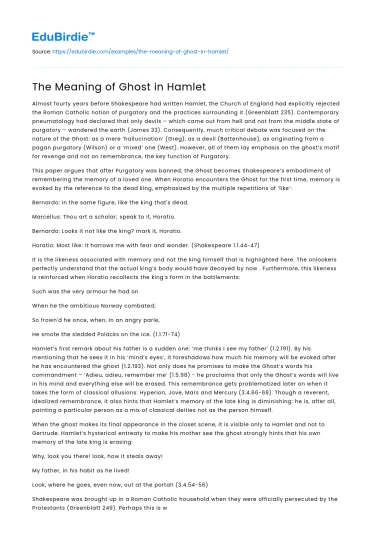Almost fourty years before Shakespeare had written Hamlet, the Church of England had explicitly rejected the Roman Catholic notion of purgatory and the practices surrounding it (Greenblatt 235). Contemporary pneumatology had declared that only devils – which came out from hell and not from the middle state of purgatory – wandered the earth (James 33). Consequently, much critical debate was focused on the nature of the Ghost: as a mere ‘hallucination’ (Greg), as a devil (Battenhouse), as originating from a pagan purgatory (Wilson) or a ‘mixed’ one (West). However, all of them lay emphasis on the ghost’s motif for revenge and not on remembrance, the key function of Purgatory.
This paper argues that after Purgatory was banned, the Ghost becomes Shakespeare’s embodiment of remembering the memory of a loved one. When Horatio encounters the Ghost for the first time, memory is evoked by the reference to the dead king, emphasized by the multiple repetitions of ‘like’:
Save your time!
We can take care of your essay
- Proper editing and formatting
- Free revision, title page, and bibliography
- Flexible prices and money-back guarantee
Bernardo: In the same figure, like the king that's dead.
Marcellus: Thou art a scholar; speak to it, Horatio.
Bernardo: Looks it not like the king? mark it, Horatio.
Horatio: Most like: it harrows me with fear and wonder. (Shakespeare 1.1.44-47)
It is the likeness associated with memory and not the king himself that is highlighted here. The onlookers perfectly understand that the actual king’s body would have decayed by now . Furthermore, this likeness is reinforced when Horatio recollects the king’s form in the battlements:
Such was the very armour he had on
When he the ambitious Norway combated;
So frown'd he once, when, in an angry parle,
He smote the sledded Polacks on the ice. (1.1.71-74)
Hamlet’s first remark about his father is a sudden one: ‘me thinks I see my father’ (1.2.191). By his mentioning that he sees it in his ‘mind’s eyes’, it foreshadows how much his memory will be evoked after he has encountered the ghost (1.2.193). Not only does he promises to make the Ghost’s words his commandment – ‘Adieu, adieu, remember me’ (1.5.98) - he proclaims that only the Ghost’s words will live in his mind and everything else will be erased. This remembrance gets problematized later on when it takes the form of classical allusions: Hyperion, Jove, Mars and Mercury (3.4.66-68). Though a reverent, idealized remembrance, it also hints that Hamlet’s memory of the late king is diminishing: he is, after all, painting a particular person as a mix of classical deities not as the person himself.
When the ghost makes its final appearance in the closet scene, it is visible only to Hamlet and not to Gertrude. Hamlet’s hysterical entreaty to make his mother see the ghost strongly hints that his own memory of the late king is erasing:
Why, look you there! look, how it steals away!
My father, in his habit as he lived!
Look, where he goes, even now, out at the portal! (3.4.54-56)
Shakespeare was brought up in a Roman Catholic household when they were officially persecuted by the Protestants (Greenblatt 249). Perhaps this is why the Ghost in Hamlet becomes an embodiment of purgatory on the stage, serving the same purpose it did before it was banned: remembering the memory of a loved one.






 Stuck on your essay?
Stuck on your essay?

